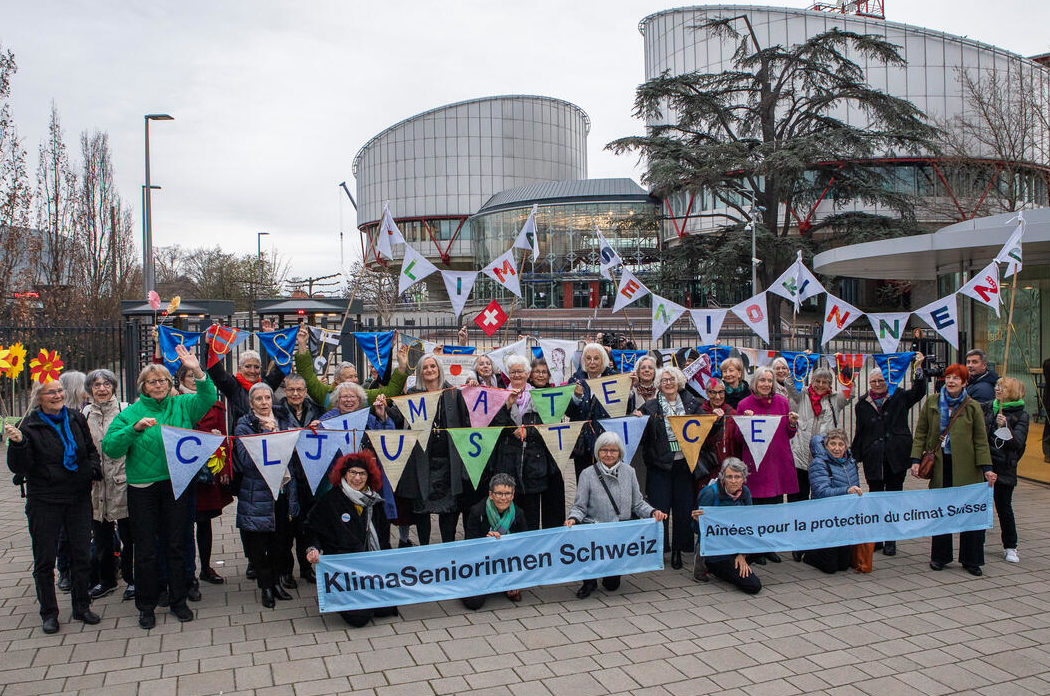- Culture
- 11 Apr 23

"If a country as rich and technologically advanced as Switzerland cannot do its fair share, [] what hope is there that other countries will step up to the challenge we face?" Marc Willers said, who represents the so-called KlimaSeniorinnen.
The Irish government has defended its decision to oppose the so-called "Swiss grannies" case in court. The case involves four women, all of whom are 74 or older, who represent a 2,000-member organisation fighting for climate action.
The group, KlimaSeniorinnen (Senior Women for Climate), has asked the European Court of Human Rights (ECHR) to declare that the Swiss government's lack of climate action is a violation of their human rights.
After a six-year battle and being defeated in the Federal Court, Switzerland's highest legal avenue, they have escalated the case to the ECHR in Strasbourg.
It is the first climate case heard by the ECHR and will be followed later this year by another in which a group of six young people accuse Portugal and 32 other countries, including Ireland, of failing to meet climate targets.
Exhibit 1:
Swiss cars are the most CO2 intensive in Europe (except for Bulgaria - wassup Bulgaria!). 124.6 grams CO2/km for NEW cars. Our neighbour, France, is at 98. And Norway is at 38. But we can't help ourselves, we just MUST drive gas guzzling SUVs? Really? pic.twitter.com/51bXECe01E— Prof Julia S. 🌍🌹🌱 #ClimateAction #FightFascism (@JKSteinberger) March 29, 2023
Advertisement
Ireland was represented by a five-person legal team at the recent Grand Chamber hearing in Strasbourg. At the hearing, the state's arguments were presented by Barrister Catherine Donnelly.
The KlimaSeniorinnen argue that because of their age, they are especially vulnerable to heat waves, which have become more common in Switzerland in recent decades and have resulted in thousands of additional deaths.
They claim that the Swiss government is failing to meet existing emission reduction targets, thereby failing to protect their lives and health. Switzerland claims its targets are strong and its commitment to reducing emissions is genuine.
▶ Watch Marc's concluding remarks below: pic.twitter.com/4pcw6uPkjO
— Garden Court Chambers (@gardencourtlaw) April 5, 2023
Switzerland also denies all of the allegations, claiming that it cannot claim special vulnerability because climate change is a global issue.
Advertisement
Ireland claims that the European Convention on Human Rights, over which the Court has jurisdiction, does not guarantee a right to a clean, healthy, and sustainable environment.
It goes on to say that the Court lacks the authority to impose national climate policies and can only intervene when there is a real and imminent threat to life. This could be the case if a member state takes or refrains from taking a specific action.
The Irish Department of Environment, Climate, and Communications stated that Ireland sought to "assist the court in clarifying the applicable principles in cases concerning human rights and climate change under the Convention".
(2) purpose of effective protection of the Convention rights and indeed climate mitigation measures."https://t.co/DSmmbxIkX6
— Charlotte Blattner (@ch_blattner) March 29, 2023
A spokesperson said the decision "was taken by Government, informed by advice from the Attorney General’s office".
"Ireland remains committed to championing progressive action and enhanced ambition at a global level, while ensuring the most vulnerable are at the centre of all our engagement."
Advertisement
The manager of the Centre for Environmental Justice at Community Law and Mediation, Clodagh Daly, was previously involved in the case and has been following the ECHR proceedings.
She said that the "CLM supports the brave plaintiffs pursuing this critically important case and calls upon the Irish government to adhere to its own legal obligations on climate change."
Whether the case is decided in favour or against the Swiss activist group will be decided by Irish Judge Siofra O'Leary at the end of the year.
 The 29th March 2023 has the potential to go down in history as a milestone in the global fight against the ever-more imminent climate crisis. For the first time ever, the European Court of Human Rights (ECtHR) in Strasbourg is holding a public hearing to assess the extent to which a nation such as Switzerland must reduce its greenhouse gas emissions more stringently to protect the human rights of its own population. The reason for this is the complaint with which the Senior Women for Climate Protection and four individual plaintiffs from Switzerland have now reached the ECHR.
The 29th March 2023 has the potential to go down in history as a milestone in the global fight against the ever-more imminent climate crisis. For the first time ever, the European Court of Human Rights (ECtHR) in Strasbourg is holding a public hearing to assess the extent to which a nation such as Switzerland must reduce its greenhouse gas emissions more stringently to protect the human rights of its own population. The reason for this is the complaint with which the Senior Women for Climate Protection and four individual plaintiffs from Switzerland have now reached the ECHR.









